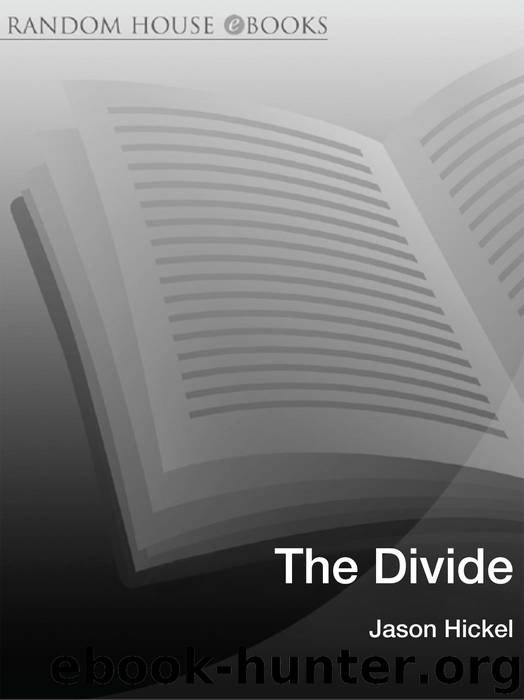The Divide by Jason Hickel

Author:Jason Hickel
Language: eng
Format: epub, mobi
Publisher: Random House
Published: 2017-05-04T04:00:00+00:00
Six
Free Trade and the Rise of the Virtual Senate
Only free men can negotiate. Prisoners cannot enter into contracts.
Nelson Mandela
At the same time that structural adjustment was being imposed across the global South, cracking open markets and clearing the way for Western exports and multinational companies, there was already something else afoot – yet another tactic with which the South would have to contend. A new organisation was being designed that would govern the emerging world of global commerce. At first glance it seemed banal – the domain of bleary-eyed technocrats sitting behind computer screens in Geneva offices – but this new organisation quickly came to be the most powerful in the world, and today enjoys the prerogative to override the sovereignty of even independent nations. Whoever controls the rules of international trade controls the flow of our planet’s vast wealth and resources – and the architects of the World Trade Organization understood this well. But the secret of this new system is that it would not appear tyrannical in the least. On the contrary, it would draw its legitimacy from the very opposite – the idea of freedom – promising the right to engage in that most human of all activities, to truck and barter, without restriction by king or state.
*
As a tactic of extraction, inequitable trade rules are nothing new. Indeed, to understand the hidden power of the modern trade system, we need to depart from our narrative arc for a moment and rewind a little bit – back to the 1770s, when the rebellious settlers of America’s East Coast were fighting for their independence from the British Crown. America’s rebels understood something about the power of trade that most people fail to grasp today – and it sparked the rage of an entire nation.
At the time, the young United States, like all colonies, was under what is known as an ‘unequal treaty’ with Britain. America’s trade tariffs were decided by London, and fixed at a low rate so as to allow British exporters the right to sell their goods on the American market with ease. The British called this ‘free trade’, and they pursued it with an almost religious zeal. But there was a double standard at play. The British were imposing low tariffs on America and their other colonies while knowing full well that their own industrial development had depended on exactly the opposite. Ever since the 14th century, and particularly during the 18th century, Britain had aggressively protected its own markets with high tariffs, excluding foreign competitors in order to build up its own industries.1
The system was rigged, and the Americans knew it.2 Indeed, they routinely referred to free trade as a ‘conspiracy’ through which the British interfered with the American economy. The Americans wanted to have greater control over their own tariffs so that they could protect themselves from British imports and successfully develop their own young industries. And that’s exactly what they got once they won the War of American Independence. After independence in 1776, the United States gained the power to formulate their own trade laws.
Download
This site does not store any files on its server. We only index and link to content provided by other sites. Please contact the content providers to delete copyright contents if any and email us, we'll remove relevant links or contents immediately.
The Meaning of the Library by unknow(2572)
Six Billion Shoppers by Porter Erisman(2304)
Why Nations Fail: The Origins of Power, Prosperity, and Poverty by Daron Acemoglu & James Robinson(2299)
No Time to Say Goodbye(2118)
Red Notice by Bill Browder(2082)
Currency Trading For Dummies by Brian Dolan(1929)
The Economist [T6, 22 Thg9 2017] by The Economist(1927)
Thank You for Being Late by Thomas L. Friedman(1772)
Bitcoin: The Ultimate Guide to the World of Bitcoin, Bitcoin Mining, Bitcoin Investing, Blockchain Technology, Cryptocurrency (2nd Edition) by Ikuya Takashima(1699)
Amazon FBA: Amazon FBA Blackbook: Everything You Need To Know to Start Your Amazon Business Empire (Amazon Empire, FBA Mastery) by John Fisher(1575)
Coffee: From Bean to Barista by Robert W. Thurston(1547)
The Future Is Asian by Parag Khanna(1484)
The Great Economists by Linda Yueh(1455)
How Money Got Free: Bitcoin and the Fight for the Future of Finance by Brian Patrick Eha(1425)
Grave New World by Stephen D. King(1421)
Pocket World in Figures 2018 by The Economist(1420)
Capitalism Without Capital: The Rise of the Intangible Economy by Jonathan Haskel(1402)
The Sex Business by Economist(1386)
Cultural Intelligence by David C. Thomas(1289)
